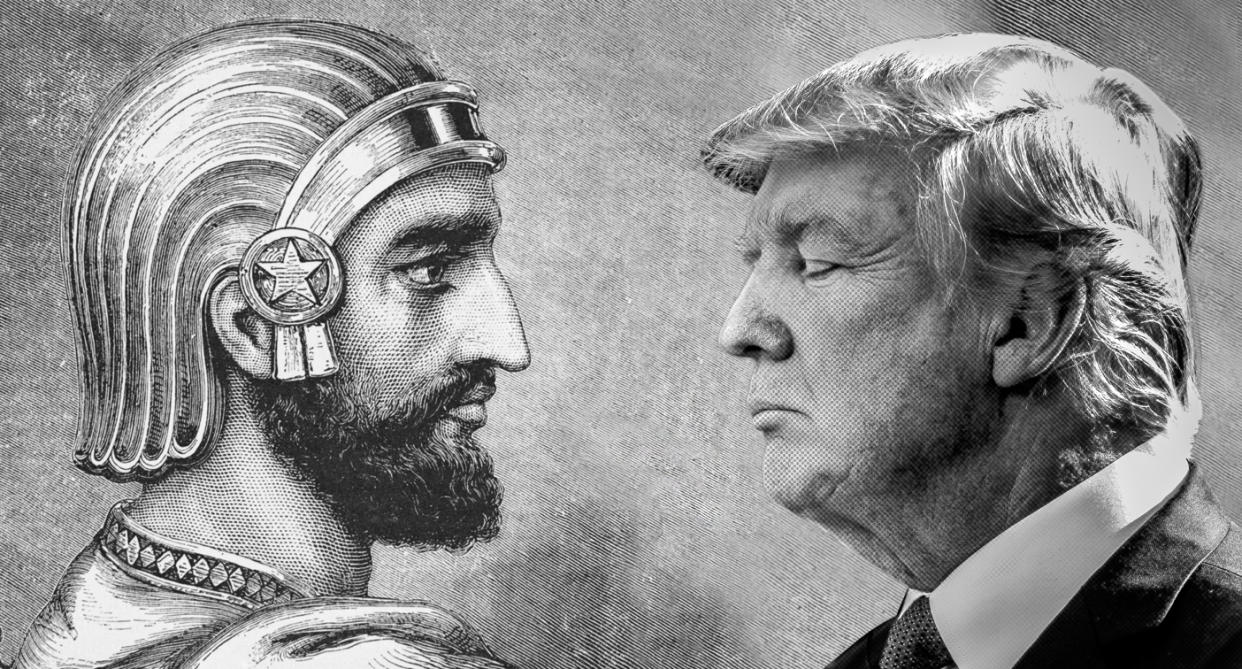In Donald Trump, Israelis hear echoes of an ancient emperor

TEL AVIV — Cyrus II of Persia founded one of the greatest empires in history, promulgated what is believed to be the world’s first declaration of human rights, and is a national hero in Iran. Oh, and ever since last December, when the United States recognized Jerusalem as the capital of Israel and made plans to relocate the U.S. embassy there, prominent Israelis have explicitly compared Donald Trump to the ruler who has gone down in history as Cyrus the Great.
The Trump-as-Cyrus meme was made explicitly by Israel’s prime minister, Benjamin Netanyahu, during his visit to Washington last month. “I want to tell you that the Jewish people have a long memory, so we remember the proclamation of the great king, Cyrus the Great,” Netanyahu said at the White House. “And we remember how a few weeks ago, President Donald J. Trump recognized Jerusalem as Israel’s capital.” Netanyahu has been joined by other prominent ministers in his right-wing coalition, including Minister of Education Naftali Bennett and Minister of Justice Ayelet Shaked, who tweeted, “Trump is in his generation as Cyrus was in his.” Yehuda Glick, the American-born rabbi who is a leader of the movement to build a third Jewish temple in Jerusalem, has said that anyone who does not see that Trump’s declaration resembles Cyrus’s “should buy himself a new pair of glasses.”
So who was Cyrus II, and why are leaders comparing him to Trump? Cyrus is mentioned in several books of the Bible, including Ezra, Isaiah, and Second Chronicles. According to the biblical narrative, after the Babylonian king Nebuchadnezzar II invaded the ancient Kingdom of Judah, he destroyed Solomon’s Temple in Jerusalem and exiled its Jewish inhabitants to Babylon in the sixth century B.C., the period known as the Babylonian Captivity. But after 70 years, the Persians under Cyrus conquered Babylonia and allowed the Jews to return to their homeland and rebuild the temple. The Second Temple stood for approximately 500 years before the Romans destroyed it.
What did Netanyahu mean by the comparison? He may have simply wished to remind the world that the historic connection of the Jewish people to their ancestral homeland goes back millennia. Or he may have sought to draw a connection between two figures who, as the leaders of the global superpowers of their respective times, were generous to the Jews. Or perhaps it was nothing more than grandiose rhetoric, intended to flatter a president known for being especially susceptible to flattery.

And of course, Netanyahu’s rhetoric may have been intended to resonate with entirely different audience: Trump’s Christian Zionist supporters. Vox’s Tara Isabella Burton has argued that some Christian evangelicals liken Trump to Cyrus in to reconcile themselves to Trump’s un-Christian behavior and personal indiscretions. Cyrus is the only non-Jew in the Hebrew Bible to whom the Hebrew word mashiach — meaning “anointed one” or “messiah” — is applied. According to Burton, for evangelicals, Trump is — like Cyrus — anointed: that is, he is an irreligious man who, despite being unbelieving himself, is nonetheless an unwitting agent of God’s plan.
And while Israelis debate whether it’s in Israel’s long-term interests to side with Trump’s pro-Israel evangelical supporters, some Israelis, along with their evangelical allies in America, discern a deeper mystical meaning in current affairs. A small but growing movement on the fringes of Orthodox Judaism in Israel hopes to build the Third Temple in Jerusalem and reinstitute the sacrificial rites practiced in the Second Temple, a messianic aspiration that has been central to Jewish liturgy ever since the Second Temple’s destruction. Some among them speculate that Trump’s Jerusalem declaration is a divine sign that indicates that Trump, like Cyrus, will permit the Jews to rebuild the temple.
Some will find religious meaning in the fact that the U.S. embassy in Jerusalem will open on May 14, the 70th anniversary of Israel’s founding. After all, 70 has special significance in Judaism: there are 70 names of Jerusalem, 70 years of King David’s reign, and 70 years of exile in Babylon. Trump has been noncommittal about fulfilling his role as “the anointed one” and presiding over the opening of the embassy — “We’re looking at coming. If I can, I will,” he said — but Israeli officials acknowledged Sunday that the ceremony will take place without him. Israeli media reported Sunday that his daughter Ivanka and son-in-law Jared Kushner, who are Jewish, will stand in for the president.
A spokesman for the White House said there was “no announcement at this time.”
Ben Manson is a freelance journalist based in Tel Aviv.
Read more from Yahoo News:


